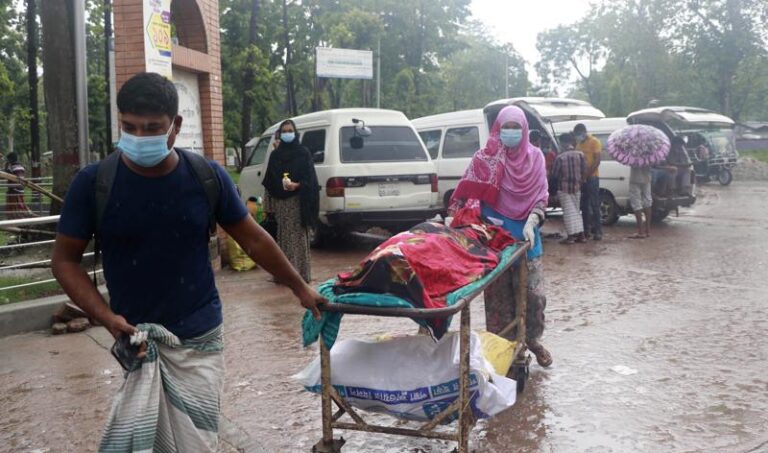
(AP) — In a state-run hospital near Bangladesh’s border with India, Shahinul Islam prays his father does not become one of the facility’s more than 300 patients who’ve died this month from the coronavirus.
Hundreds like his father are struggling to breathe in the COVID-19 treatment unit, while Islam waits in an emergency room packed with people. Relatives rush in and out, desperately trying to find oxygen cylinders for their loved ones.
The crowds of COVID-19 patients and worried kin are new scenes for the 1,200-bed Rajshahi Medical College Hospital, which serves border communities being overrun by the more infectious delta variant first detected in neighboring India.
Over 450 people with COVID-19 were admitted on Tuesday to the state-run hospital in Rajshahi district’s main city.
Islam said his entire family has been shunned by people in his home village closer to the border. “The other villagers are afraid of us. They don’t talk to us. When they see us on the road, they take a different path,” he said. “We are suffering a lot,” he added.
Rising infections and crowded hospitals are being seen across Bangladesh, where a stringent lockdown starts Thursday. The government will deploy military soldiers, paramilitary border officers and riot police to enforce the lockdown, set initially for one week. Authorities warn that the rapid surge in border areas is accelerating the virus’ spread further into Bangladesh, and the increasing number of infections from the delta variant could devastate the South Asian nation of more than 160 million people.
“If people do not maintain health safety rules and if they do not stay at home, this wave of the pandemic in Bangladesh could be catastrophic. It spreads fast and it kills more people,” said A.S.M. Alamgir, a chief scientific officer of the government’s Institute of Epidemiology, Disease Control and Research in the capital, Dhaka.
Many border districts in northern and southwestern Bangladesh were spared from COVID-19 until now, so people lack antibodies against the virus. That combined with the large numbers of unvaccinated people makes the population much more vulnerable.
Just over 4 million people are fully immunized. Another 1.5 million have received one dose, but the shortage of Oxford-AstraZeneca imports, halted by India, have left them uncertain when they’ll get their second dose.
The Rajshahi hospital is also short of the type of oxygen supply system necessary for critical patients at a time when it’s seeing more and more patients with worryingly low oxygen levels. High flow nasal cannula delivers steady continuous oxygen to such patients, but government hospitals in border districts have been forced to rely on portable oxygen cylinders instead.






